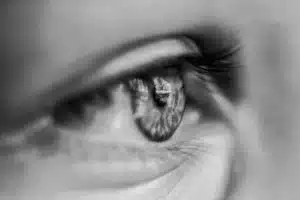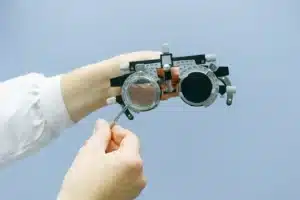Our bodies go through a variety of changes as we age. Some of these changes are both positive and necessary, while other changes are negative and unwanted. Your goal in life should be to maximize the number of positive changes while minimizing all the negative changes.
The sad truth that many people face is that some negative changes can’t be avoided. As we age, some things are just meant to be and there’s nothing we can do but manage and control them as best as possible. It’s a harsh reality that no one wants to hear, but a reality nonetheless.
Your vision is a perfect example of this. Over time, your eyes are going to experience a number of changes that may impact your ability to see clearly. Some of these changes are preventable and curable, but others — such as macular degeneration — are just part of the aging process.
So, what is macular degeneration?
Macular Degeneration , also known as age-related macular degeneration (AMD), is the leading cause of permanent vision loss in elders and impacts over 11 million people in the United States alone — a number that’s expected to nearly double over the next 30 years (22 million by 2050).
AMD is an eye disease that impacts the macula, which is the part of the retina (back of the eye) that’s responsible for central vision. As we age, the macula can become damaged and result in blurred straight-ahead vision — not peripheral vision. It generally happens very slowly over time.
Although macular degeneration causes severe vision loss, it won’t result in total blindness — because it doesn’t impact peripheral vision. With that said, it does make it difficult to see what’s straight ahead, which impacts your ability to read, recognize people, watch TV, and more.
There are two major types of macular degeneration — wet macular degeneration and dry macular degeneration. There’s also juvenile macular degeneration, also known as Stargardt’s disease, which occurs in young adults and children.
Wet Macular Degeneration (Wet AMD)
Also known as advanced neovascular AMD, wet macular degeneration occurs when blood vessels form underneath the macula. When the blood vessels leak blood and fluid into the retina, scars develop that result in central vision loss. It’s a form of late-stage AMD.
People with wet AMD typically experience distorted vision that makes straight lines look wavy. You may experience blurred spots, dark spots, and hazy vision. Although any case of AMD can develop into wet AMD, it will always develop in the late stages and often happen quickly.
Dry Macular Degeneration (Dry AMD)
Also known as atrophic AMD, dry macular degeneration is the most common form of AMD. It’s a result of the natural thinning of the light-sensitive cells in the macula, which happens in three stages — the early stage, intermediate stage, and late stage. It generally progresses slowly.
With dry AMD, yellow deposits — known as drusen — form in the macula. As the drusen grow larger, it causes the macula to thin out and eventually die. Although there’s no treatment for late-stage dry AMD, there are steps you can take in the early stages to slow the progress.
Early Signs & Symptoms of Macular Degeneration
Like any other eye disease, it’s important that you know the early warning signs and symptoms of age-related macular degeneration. Not only will this help you detect AMD in its early stage, but it’ll help you preserve your vision for as long as possible by receiving quick treatment.
Some of the early symptoms of dry macular degeneration include:
- Reduced central vision
- Distorted straight lines in the field of vision
- Needing bright lights
- Hard time adapting to low lights
- Blurred vision
- Difficulty recognizing faces
- Damage to your retina
Some of the early symptoms of wet macular degeneration include:
- Blurred vision
- Dark spots in your field of vision
- Hazy vision
- Symptoms that quickly worsen
While most people experience macular degeneration as they age, there are a variety of things that increase your risk of it. For example, having a history of AMD in your family is one risk factor, as well as high blood pressure levels, high cholesterol levels, obesity, and smoking.
Diagnosis & Treatment for Macular Degeneration
Scheduling a regular eye exam with your ophthalmologist is extremely important to your eye health. There are a variety of tests they can administer that can detect and diagnose macular degeneration in its early stages — such as a comprehensive dilated eye exam.
During the exam, your doctor might perform an Amsler grid test, a fluorescein angiography, indocyanine green angiography, or optical coherence tomography in order to detect and diagnose macular degeneration.
While there is no cure for macular degeneration, there are a variety of treatments that can help slow the progress of macular degeneration and help preserve your vision for as long as possible. Of course, treatment largely depends on the type and stage of macular degeneration.
Unfortunately, there currently isn’t any treatment for early AMD. Your eye doctor will monitor your symptoms closely and likely recommend some lifestyle changes that might slow the progress — such as eating a healthier diet, nutritional supplements, exercising more regularly, and quitting smoking.
As the disease progresses, your doctor will likely turn to vitamin and mineral supplements to prevent intermediate macular degeneration from turning into advanced macular degeneration. For late-stage AMD and wet AMD, your doctor might recommend anti-VEGF drugs or photodynamic therapy (PDT).
Contact Milwaukee Eye Surgeons Immediately
Your vision plays an enormous role in your ability to live a quality life. That’s why any issues with your vision — including macular degeneration — need to be detected, diagnosed and treated as soon as possible. The earlier it’s detected, the better chance you have at reducing symptoms.
If you’re experiencing macular degeneration or are worried about some of the symptoms you’re experiencing, don’t hesitate to contact us immediately. At Milwaukee Eye Surgeons , we’re dedicated to helping you preserve your vision and eye health for as long as possible.
Even if you’re not experiencing any symptoms, it’s always best to schedule a regular visit with your eye doctor, especially since a regular eye exam can detect an issue before symptoms arise.

